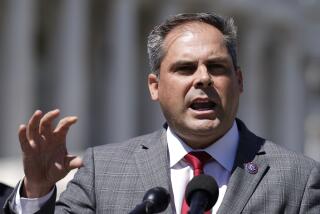Lawmakers say theyâre fixing roads and fighting drugs and diseases. They just wonât pay for it.
Reporting from Washington â Senate Majority Leader Mitch McConnell (R-Ky.) delivered a stern warning recently as he urged support for legislation to combat skyrocketing drug abuse. âThere is an epidemic sweeping across our nation,â he intoned.
Other Republican lawmakers followed. Sen. Rob Portman of Ohio talked of an âurgent problemâ with âa grip on so many of our constituents.â Pennsylvania Sen. Patrick J. Toomey warned that addiction was âdevastating families and communities in our states.â Last month the Senate voted 94 to 1 for the bill.
When it came to paying for the effort, however, there was no similar outpouring. The Senate rejected calls for $600 million in emergency federal aid.
It wasnât the first time that resources didnât match the rhetoric.
Congressional Republicans in recent months have repeatedly trumpeted their work on crumbling roads, inadequate care for patients with mental illness and other pressing issues. Yet time and again, lawmakers declined to put up the money.
They refused emergency funding to control an expected outbreak of the Zika virus, saying the Obama administration should use existing money. (Republican congressional leaders are now reconsidering.)
A push to modernize the nationâs fractured mental health system is stalling, in part over resistance by congressional Republicans to new investments.
And at the end of last year, Congress turned aside pleas to modernize funding for roads and bridges, which hasnât been updated in more than two decades.
âIt seems like lawmakers are great at passing bills. Theyâre not so good at providing money to pay for things,â said Richard Nance, who directs alcohol and drug treatment programs in Utah County, south of Salt Lake City.
Like public health officials, law enforcement leaders and clinic operators nationwide, Nance says heâs been overwhelmed by the surge in heroin and prescription drug abuse in recent years.
Heâd like to build a second residential treatment center because the current facility is always full. But the county hasnât had the money, in part because Utah rejected new federal funding in 2014 to expand its Medicaid program through the Affordable Care Act.
Congressional Republicans say theyâre protecting taxpayer money at a time when government spending is out of control.
âEvery day, Americans make tough, responsible decisions.⌠They know that they have a limited amount of dollars to spend,â House Budget Committee chairman Tom Price (R-Ga.) said in his 2017 budget blueprint. âWashington has either forgotten these simple rules of the road or, worse, decided it does not have to abide by them.â
Price has proposed to slash some $6 trillion from the federal budget over the next decade, and many Republicans are demanding even more cuts.
Federal spending, driven largely by healthcare and retirement programs such as Medicare and Social Security, is indeed increasing as a share of the economy.
Less noted has been the erosion of federal spending that is not earmarked for the military or for Medicare, Social Security or other entitlement programs. This part of the budget â which supports other government services such as transportation, scientific research and education â has been steadily declining since 2010, driven in part by a series of budget deals.
So-called nondefense discretionary spending is now projected to reach its lowest level relative to the economy since 1962, according to an analysis by the Center on Budget and Policy Priorities, a left-leaning Washington think tank.
âThis Congress is simply opposed to spending money on much of anything,â said David Reich, a senior fellow at the center and former congressional budget staffer.
Nor has there been any appetite for raising additional revenue, though federal taxes are roughly on par with the historic average (and remain low by international standards).
When Congress approved a five-year transportation bill in December to fund road and transit projects for the next five years, lawmakers refused to raise the gasoline tax to pay for it.
Instead, they tapped a series of reserves not intended for transportation, including a rainy-day account in the Federal Reserve system and proceeds from selling off part of the nationâs strategic petroleum reserve.
The 18.4-cent-per-gallon gas tax, designed to fund roads and bridges, hasnât been raised since 1993. As a result, the tax has lost about half its value over the last two decades due to inflation.
Altogether, federal investment in highways buys less now than at any time in the last quarter-century, according to a recent report by the nonpartisan Congressional Budget Office.
Public health officials nationwide are confronting similar shortfalls, even as they confront the opioid epidemic and plan for an anticipated outbreak of Zika this summer.
In Baltimore, the City Health Department is preparing to reassign staff in anticipation of cuts from the federal Centers for Disease Control and Prevention. The CDC is looking to shift money to respond to Zika after senior Republicans refused a $1.8-billion emergency funding request from the Obama administration.
The congressional reluctance to pay for infrastructure, disease prevention and other priorities hasnât stopped lawmakers from voicing commitments to action.
When the transportation bill passed last year, a parade of lawmakers celebrated what House Transportation Committee Chairman Bill Shuster (R-Pa.) called âan investment in America and the infrastructure that underpins our economy.â
Congressional leaders similarly have lined up to pledge their support for reforming the mental health system in the face of what Senate Health Committee Chairman Lamar Alexander (R-Tenn.) recently called a âmental health crisis.â
During the recent Senate debate over the opioid bill, several lawmakers said additional money was unnecessary, as Congress approved a funding increase in December. Federal health officials say that money will only fund grants to about a dozen states, leaving many more without access to emergency aid.
Outside Washington, patience is wearing thin with the rhetoric.
âPeople who say they are passionate about these issues should not be able to get away with just sharing sob stories,â said Baltimore Health Commissioner Leana Wen. Baltimore saw a nearly 50% increase in drug overdose deaths last year.
âWe need people to commit funding.â Wen said. âOtherwise, we are just treading water.â
ALSO:
How a healthcare revolution came to one red state while the Obamacare battle raged on
Trump promised a âbeautifulâ healthcare plan, but itâs pretty basic
More to Read
Sign up for Essential California
The most important California stories and recommendations in your inbox every morning.
You may occasionally receive promotional content from the Los Angeles Times.











